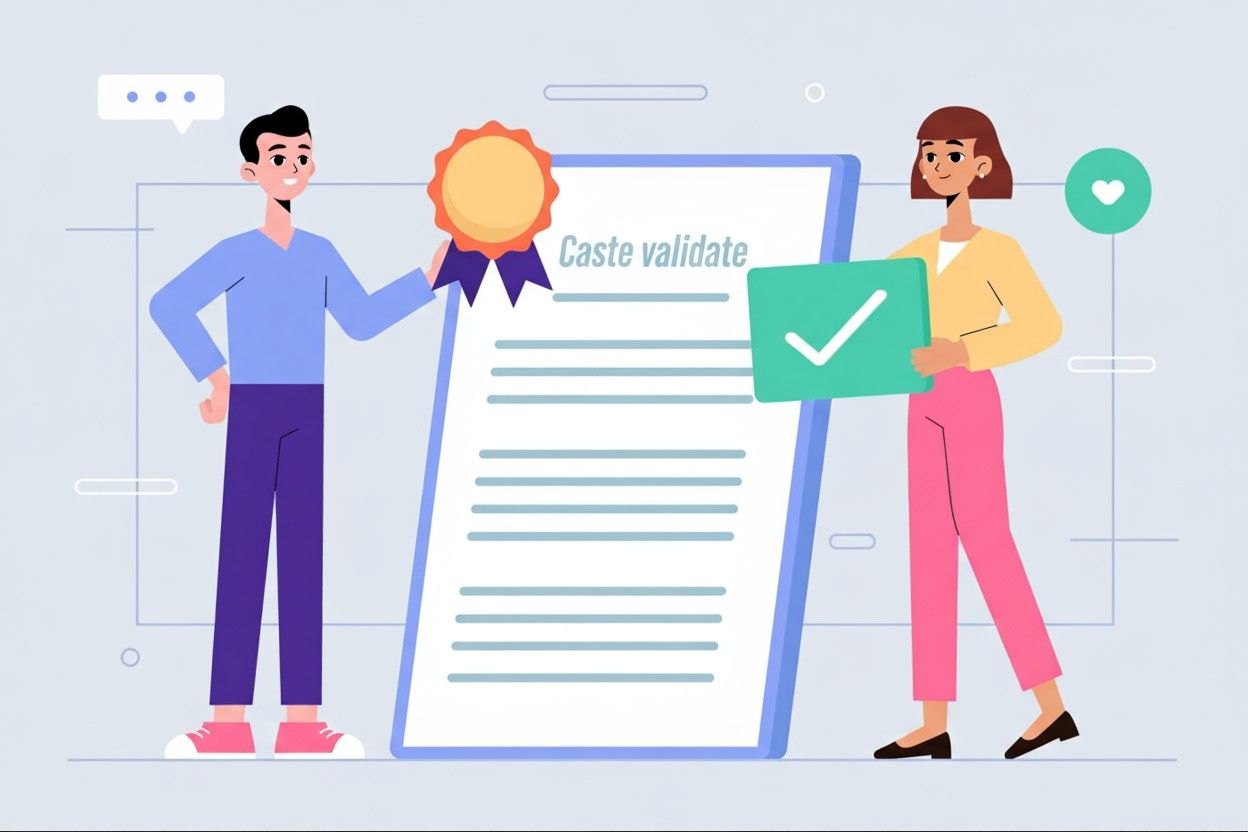A caste validity certificate is an essential government-issued document that verifies the authenticity of an individual’s caste certificate. It plays a vital role in accessing reservations in education, government jobs, scholarships, and other welfare schemes. Without proper caste validity verification, applications for these benefits may be rejected.
This guide explains the importance of caste validity, the required documents, the step-by-step online and offline application process, and how to verify caste validity online across different states in India.
Applicants preparing for competitive exams often rely on a quick personal loan to cover coaching or travel costs until caste validity verification is completed.
Why is the Caste Validity Certificate Important?
- Ensures legal verification of caste claims.
- Mandatory for reserved category benefits in education and employment.
- Required for competitive exam eligibility (UPSC, SSC, MPSC, etc.).
- Helps avoid fraudulent caste claims.
Along with government welfare schemes, individuals may consider private finance solutions for immediate financial support.
Documents Required for Caste Validity Application
Applicants generally need the following documents for caste validity verification:
- Original caste certificate.
- Proof of residence (Aadhar card, voter ID, ration card).
- Birth certificate or school leaving certificate.
- Affidavit in prescribed format (if applicable).
- Parents’ caste certificate (if required by state rules).
How to Apply for a Caste Validity Certificate Online
The online process for caste validity verification is simple and can be done through state government portals:
- Visit your respective state’s Social Welfare / Caste Validity Portal.
- Register with valid personal details and a mobile number.
- Fill in the caste validity application form with accurate information.
- Upload scanned copies of the required documents.
- Submit the application and note the reference/application number.
- Track caste validity status online through the portal.
Offline Application for Caste Validity Certificate
If online services are not available, applicants can submit forms at:
- District Social Welfare Office.
- Tahsildar / Sub-Divisional Office.
- Local government offices authorized for caste validity verification.
Caste Validity Verification Process
The verification process involves:
- Checking document authenticity.
- Scrutiny by the caste scrutiny committee.
- Cross-verification of family records.
- Issuance of a caste validity certificate if all details are correct.
State-Wise Online Portals for Caste Validity Application & Verification
| State | Online Portal for Caste Validity |
|---|---|
| Maharashtra | https://castevalidity.mahaonline.gov.in |
| Karnataka | https://casteverification.karnataka.gov.in |
| Madhya Pradesh | https://www.mponline.gov.in |
| Tamil Nadu | https://www.tnesevai.tn.gov.in |
| Gujarat | https://digitalgujarat.gov.in |
| Rajasthan | https://sso.rajasthan.gov.in |
| Uttar Pradesh | http://castecert.up.nic.in |
| Bihar | https://serviceonline.bihar.gov.in |
| Chhattisgarh | https://edistrict.cgstate.gov.in |
| Odisha | https://edistrict.odisha.gov.in |
| Jharkhand | https://jharsewa.jharkhand.gov.in |
| Telangana | https://ts.meeseva.telangana.gov.in |
| Andhra Pradesh | https://ap.meeseva.gov.in |
| West Bengal | https://casteservices.wb.gov.in |
| Kerala | https://citizen.lsgkerala.gov.in |
| Haryana | https://saralharyana.gov.in |
| Punjab | https://esewa.punjab.gov.in |
(Students should always verify from their respective university portal for the most updated process.)
Key Tips for Applicants
- Always use the official portal for caste validity verification.
- Keep scanned copies of documents under 2MB for smooth upload.
- Track the caste validity application regularly to avoid delays.
- Apply well before deadlines for education/job requirements.
FAQs – Long-Tail Keyword Integration
1. How can a quick personal loan support applicants during caste validity verification?
Applicants preparing for competitive exams often rely on a quick personal loan to cover coaching or travel costs until caste validity verification is completed, ensuring they stay financially prepared.
2. Are private finance solutions helpful while applying for caste validity certificates?
Along with government welfare schemes, individuals may consider private finance solutions for immediate financial support, especially for expenses related to documentation, admission, or relocation.
3. Why is caste validity verification necessary for reserved category benefits?
It ensures legal verification of caste claims and prevents fraudulent applications, enabling applicants to access scholarships, job reservations, and education benefits without issues.
4. What documents are required to complete a caste validity application online?
Applicants need their original caste certificate, proof of residence, birth certificate or school leaving certificate, affidavit if required, and parents’ caste certificate based on state rules.
5. How can I track my caste validity application online?
Applicants can log in to their state’s official portal, navigate to the tracking section, enter the application ID, and view the approval or pending status.
6. Which state portals offer online caste validity services in India?
States such as Maharashtra, Karnataka, Madhya Pradesh, Tamil Nadu, Gujarat, Rajasthan, Uttar Pradesh, Bihar, Chhattisgarh, Odisha, Jharkhand, Telangana, Andhra Pradesh, West Bengal, Kerala, Haryana, and Punjab provide online caste validity services through their official portals.
Conclusion
Applying for a caste validity certificate is an important step for students and job aspirants belonging to reserved categories. With caste validity verification online, the process has become simpler and more transparent. By using the respective state portals and submitting valid documents, applicants can ensure the timely approval of their caste validity certificate. Additionally, with access to quick personal loans and private finance solutions, applicants can manage related expenses easily, ensuring that their educational and professional aspirations are not delayed.





I have read so many content about the blogger lovers however this paragraph
is truly a nice piece of writing, keep it up.